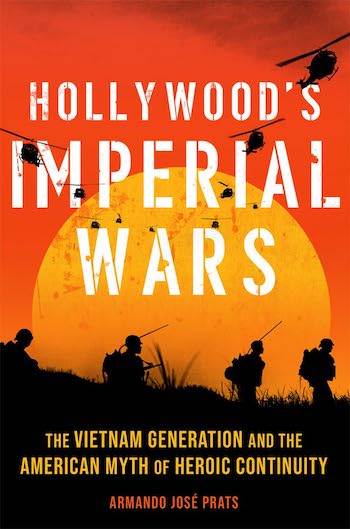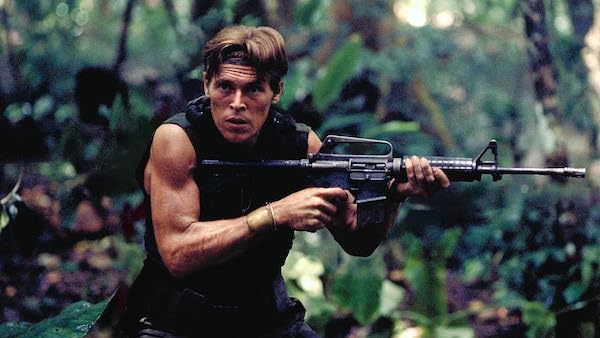Book Review: “Hollywood’s Imperial Wars” — Darkness Visible
By Kevin Canfield
Hollywood’s Imperial Wars is at its best as a bold and informative survey of the movies that the studios felt it was “credibly possible” for them to make after Vietnam.
Hollywood’s Imperial Wars: The Vietnam Generation and the American Myth of Heroic Continuity by Armando José Prats. The University of Oklahoma Press, 336 pages, $45.

The reading public may not be clamoring for a sober reassessment of decades-old war films, but its limited commercial potential doesn’t diminish the effectiveness of Armando José Prats’s perceptive new book, which refreshingly resists the impulse to characterize its subject as “timely” or the movies it discusses as “prophetic,” opting instead for the hard, unglamorous work of identifying distinctive ways to think about a bleak strain of American entertainment.
In Hollywood’s Imperial Wars: The Vietnam Generation and the American Myth of Heroic Continuity, Prats focuses on two batches of films. The first group, released between the late ’30s and the late ’60s, uniformly celebrates US soldiers and their broader mission, be they embodiments of Manifest Destiny, conquerors of distant island nations, or servicemen united by a commitment to pummel Nazi Germany. The second group, the work of New Hollywood iconoclasts like Michael Cimino and Francis Ford Coppola, and slightly younger filmmakers such as Oliver Stone, reckons with the Vietnam War’s massive death toll and the suffering endured by those who survived.
How, Prats asks, did the latter group of movies “respond to the once unthinkable, to the now so sudden and grim actuality that America had lost a war” in light of the earlier films’ “harsh proscription that losers could not be heroes”? This is an old question, but Prats finds fresh ways to answer it. This emeritus University of Kentucky English professor has a sharp eye for spotting what’s absent in a narrative, the inconvenient detail that’s been excised to make a story easier to market and consume. This is most evident in his look at the film that made Oliver Stone famous.
When it was released in 1986, Platoon was hailed as the antithesis of another recent Vietnam War movie. Per some critics, the Sylvester Stallone-starring Rambo: First Blood Part II deployed empty patriotism and racist stereotypes, while Vietnam veteran Stone’s film drew on its equally brutal imagery to make a timeless and humane plea for peace. No less a cultural institution than movie reviewer Roger Ebert began his review by arguing that Platoon proved Francois Truffaut, the French New Wave giant, was wrong when he claimed that “every film about war ends up being pro-war.”
Prats suggests that the praise heaped on Platoon and some other self-consciously introspective Vietnam War films misses their inherent self-absorption, their promulgation of a worldview that perpetuates a blinkered understanding of a conflict that killed about 58,000 American soldiers and hundreds of thousands of Vietnamese. Prats argues that when Chris Taylor (Charlie Sheen), the film’s protagonist, declares at the end of his tour that the war was lost because “the enemy was in us,” he’s merely repeating an arrogant half-truth.
Taylor’s interpretation “denies the Vietnamese any agency in the historical (and historic) outcome. The force and effectiveness of the enemy — of their traditions, culture, and love of country, and of the military genius that yet failed to spare them the enormity of their sacrifice — does not figure in Taylor’s reckoning.” Prats’s view of the film is a tough rejoinder to much of what’s been written, in admiration, about Platoon over the years.

William Dafoe in Platoon. Photo: Prime Video
In contrast to the roles that made him a big-screen avatar of American battlefield valor, John Wayne serves as Prats’s antihero, an actor whose myth-making impact on Baby Boomers who fought in, and made movies about, Vietnam “is impossible to overestimate.” Whether his character battled Japanese in Allan Dwan’s Sands of Iwo Jima, Apaches in John Ford’s Rio Grande, or Vietnamese in The Green Berets, which Wayne and Ray Kellogg co-directed, his “movie heroism radiated a sense of America’s righteous might.” Prats reinforces this point by citing a host of writers, from Joan Didion to Gary Wills to Philip Caputo, who, in his Vietnam memoir A Rumor of War, wrote of fantasizing about “charging up some distant beachhead, like John Wayne in Sands of Iwo Jima, and then coming home a suntanned warrior with medals on my chest.”
Wayne himself “quietly sidestepped military service,” Prats writes, but that didn’t stop him from questioning the fortitude of those who avoided fighting in Vietnam. How did younger filmmakers respond to Wayne’s bluster? In Cimino’s The Deer Hunter, Prats notes, a character played by John Cazale embarrasses himself by bringing a pistol on a stateside hunting trip –“all he’s got is that stupid gun he carries around like John Wayne,” says his friend Michael (Robert De Niro), who will be irreparably harmed by the Vietnam war. Stanley Kubrick went further in Full Metal Jacket. In that film, a hard-ass drill sergeant (R. Lee Ermey) obsessed with Wayne — his radio handle cites the actor’s nickname, “Duke” — is murdered by one of his men in the least ennobling place imaginable, a communal toilet.
The seminal role that Wayne’s war films played in the lives of young Baby Boomers has been discussed before, but rarely in a way that ties together a century of movie history. Prats accomplishes this feat in a solid closing chapter on Gran Torino and American Sniper, Clint Eastwood–directed depictions of postwar trauma and regret as experienced by, respectively, a fictional Korean War veteran and “the latest iteration of America’s frontier hero,” real-life Iraq War vet Chris Kyle.
Prats is an academic, but he makes his case in accessible, if occasionally dense, prose. Hollywood’s Imperial Wars is at its best as a bold and informative survey of the movies that the studios felt it was “credibly possible” for them to make after Vietnam. In one strong chapter, the critic’s attention to verbal detail shapes a revealing analysis of Coppola’s Apocalypse Now. When Capt. Benjamin Willard (Martin Sheen) arrives to kill him, round-the-bend Col. Walter Kurtz (Marlon Brando) praises Viet Cong fighters who purportedly chopped off the arms of Vietnamese children vaccinated by American medics. Kurtz says, “You have to have men who are moral and, at the same time, who are able to utilize their primordial instincts to kill without feeling, without passion, without judgment — without judgment. Because it’s judgment that defeats us.” Kurtz’s fixation on “judgment,” Prats argues, echoes the words of infamous American soldier William Calley. After killing numerous Vietnamese civilians in what became known as the My Lai massacre, Calley told a military court that “the only crime I’ve committed is in judgment of my values. Apparently I valued my troops’ lives more than I did that of the enemy.”
Not all of Prats’s observations are winners. Based on the fact that some fictional characters own weapons with nicknames, he wastes energy hunting for an illusory link between, among others, a BB-gun-loving boy in the holiday-season standard A Christmas Story and an unstable character in Full Metal Jacket. And his take on the beginning of Apocalypse Now, soundtracked by the Doors’ “The End,” makes more of the song’s lyrics than they’re worth. An author who judiciously quotes Didion and Wills — not to mention Shakespeare, Milton, and Leviticus — should not take Jim Morrison too seriously. Happily, these are just blips in an otherwise thought-provoking and well-argued book.
Kevin Canfield has reviewed books for the New York Times, Cineaste, and other publications. He lives in New York City.

This book sounds interesting, although I find the summation of its view on Platoon off. First, that movies of the 1970’s did not take the Vietnamese into account is not new. There’s even a well-known joke by a British comedian: “The U.S. will not only invade your country, but then make a bunch of movies about how it made their soldiers feel sad.”
But to argue that Platoon, in particular, has a “blinkered worldview” and “self-absorption” ignores that is the very point of the movie. The thing that separates Platoon from the other films is that it is the fictional memoir of a veteran who was there. His experience was that the ground level combat troops were young American men who, at best, were indifferent and sporadically nice to the Vietnamese civilians. At worst, they were racist and awful and violent. But none of the soldiers discussed the political forces which brought them to Southeast Asia, “We were into survival,” to quote Stone. To have included a scene where the American soldiers all sit around and discuss geopolitical forces, the brilliance of the enemy’s strategy and the long term impact on the country’s civilians would not have been truthful to Stone’s experience and intellectually dishonest – regardless that it may have satisfied fair-minded academics decades later when writing their thinkpieces.
It can also be a dangerous line of thinking, because you are applying presentism to the decisions and behavior of people 50 years ago. You cannot understand the war’s impact if you don’t know that many of the young men sent there to fight (some against their will) did so with no clear objectives and/or outright resentment. Read Oliver Stone’s excellent memoir Chasing the Light, and you will know that he joined the Army precisely as a blinkered and self-absorbed 20 year old who thought he was fighting Communism. Most of the other young men he fought with either were of a similar mindset, or simply did not think about the origins of the war at all. The closest he saw to political awareness were some of the Black soldiers he served with, who were concerned with race relations and the civil rights movement back in the U.S.
It was not until years and years later that Stone ever began to see the war in a historical, not personal, context. He first tried to put everything out of his mind, precisely so he did not have to deal with the large chasm of how the U.S. government portrayed the war and what he saw on the ground. But he put that awareness into his later two Vietnam films, Born on the Fourth of July and Heaven and Earth (especially the latter, which is from a Vietnamese perspective). But Platoon is his (fictionalized) account of his experience barely out of his teens, and it rubs the wrong way to suggest that a survivor’s story should stop and spoonfeed its audience the large macro context. Especially when that context is available in plenty of other places. (“Eli Weisel, before you start, can you tell us how the economy of Weimar Germany laid the groundwork for the rise of Nazism?”)
I’ll close with a quote from Stone’s memoir Chasing the Light: “Success was a beautiful goddess, yes, but was I being seduced by this vindication, this proving myself to my father; was it the acceptance, the power? What did I really believe? I’d made it a moral issue that America was truly wounding itself in Vietnam with our struggle between pro-war/antiwar, right/left, Barnes/Elias, but was I avoiding the larger moral issue of the wholesale slaughter of 3 to 4 million Vietnamese people—and all that implied? What had really happened to America?”